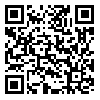Volume 26, Issue 1 (Spring--In Press 2025)
jrehab 2025, 26(1): 0-0 |
Back to browse issues page
Download citation:
BibTeX | RIS | EndNote | Medlars | ProCite | Reference Manager | RefWorks
Send citation to:



BibTeX | RIS | EndNote | Medlars | ProCite | Reference Manager | RefWorks
Send citation to:
Khashaman F, Bahmani B, Ghaedamini Harooni G. Development and Investigating of the Validity and Reliability of Empty Nest Syndrome Questionnaire Among the Elderly. jrehab 2025; 26 (1)
URL: http://rehabilitationj.uswr.ac.ir/article-1-3367-en.html
URL: http://rehabilitationj.uswr.ac.ir/article-1-3367-en.html
1- Counseling Department, Faculty of Rehabilitation Sciences, University of Rehabilitation Sciences and Social Health, Tehran, Iran. , fkhashaman6@gmail.com
2- Counseling Department, Faculty of Rehabilitation Sciences, University of Rehabilitation Sciences and Social Health, Tehran, Iran., tehran,velenjak,university of social welfare and rehabilitation science
3- Department of Social Welfare, Faculty of Rehabilitation Sciences, University of Rehabilitation Sciences and Social Health, Tehran, Iran., tehran,velenjak,university of social welfare and rehabilitation science
2- Counseling Department, Faculty of Rehabilitation Sciences, University of Rehabilitation Sciences and Social Health, Tehran, Iran., tehran,velenjak,university of social welfare and rehabilitation science
3- Department of Social Welfare, Faculty of Rehabilitation Sciences, University of Rehabilitation Sciences and Social Health, Tehran, Iran., tehran,velenjak,university of social welfare and rehabilitation science
Abstract: (282 Views)
Background and Objectives: The objective assessment of the empty nest syndrome is crucial due to its prevalence and impact on the lives of elderly parents. This study constructs, standardizes, and tests the reliability and validity of the empty nest syndrome questionnaire among the elderly.
Methods: This study investigates the psychometric properties of the empty nest syndrome questionnaire. The research sample included 181 elderly residents of Tehran City, Iran, in 2021, selected randomly by visiting their homes. The construction of the questionnaire involved four steps: 1) reviewing Persian and English theoretical texts and conducting semi-structured interviews with experts; 2) identifying symptoms related to empty nest syndrome and developing the item pool; 3) assessing face and content validity; 4) examining reliability and construct validity of the instrument. Content validity was assessed using the content validity ratio by a panel of experts (6 individuals specialized in psychology, counseling, and gerontology). Reliability over time (one week) was tested using the Pearson correlation. And, internal consistency was examined using the Cronbach α coefficient. Statistical analysis was performed using SPSS version 26 and AMOS version 24.
Results: The agreement threshold for the content validity ratio was set at 0.99 based on the number of experts, resulting in 20 out of 40 questions from the initial pool not meeting the required threshold. After administering the 20-item questionnaire to the target population, exploratory factor analysis was conducted, resulting in three sub-scales. Due to item misalignment with sub-scales, 5 items were removed, finalizing a 15-item questionnaire. The obtained Cronbach α coefficients ranged from 0.80 to 0.93, with a total tool α of 0.88, indicating acceptable reliability. The model fit indices obtained from factor loadings were comparative fit index = 0.84, Chi-square minimum discrepancy = 4.4, and root mean square error of approximation = 0.137, showing that the researcher-made questionnaire is appropriately fitted. Participants' scores across the three sub-scales ranged from 15 to 95. Scores from 1 to 33 indicate mild empty nest syndrome, 33.1 to 55 indicate moderate, and 55.1 to 75 indicate high levels of syndrome presence. The temporal reliability obtained was 0.994, indicating the high reliability of the test.
Conclusion: The empty nest syndrome questionnaire demonstrates appropriate reliability and validity and can be used to assess this syndrome in various studies.
Methods: This study investigates the psychometric properties of the empty nest syndrome questionnaire. The research sample included 181 elderly residents of Tehran City, Iran, in 2021, selected randomly by visiting their homes. The construction of the questionnaire involved four steps: 1) reviewing Persian and English theoretical texts and conducting semi-structured interviews with experts; 2) identifying symptoms related to empty nest syndrome and developing the item pool; 3) assessing face and content validity; 4) examining reliability and construct validity of the instrument. Content validity was assessed using the content validity ratio by a panel of experts (6 individuals specialized in psychology, counseling, and gerontology). Reliability over time (one week) was tested using the Pearson correlation. And, internal consistency was examined using the Cronbach α coefficient. Statistical analysis was performed using SPSS version 26 and AMOS version 24.
Results: The agreement threshold for the content validity ratio was set at 0.99 based on the number of experts, resulting in 20 out of 40 questions from the initial pool not meeting the required threshold. After administering the 20-item questionnaire to the target population, exploratory factor analysis was conducted, resulting in three sub-scales. Due to item misalignment with sub-scales, 5 items were removed, finalizing a 15-item questionnaire. The obtained Cronbach α coefficients ranged from 0.80 to 0.93, with a total tool α of 0.88, indicating acceptable reliability. The model fit indices obtained from factor loadings were comparative fit index = 0.84, Chi-square minimum discrepancy = 4.4, and root mean square error of approximation = 0.137, showing that the researcher-made questionnaire is appropriately fitted. Participants' scores across the three sub-scales ranged from 15 to 95. Scores from 1 to 33 indicate mild empty nest syndrome, 33.1 to 55 indicate moderate, and 55.1 to 75 indicate high levels of syndrome presence. The temporal reliability obtained was 0.994, indicating the high reliability of the test.
Conclusion: The empty nest syndrome questionnaire demonstrates appropriate reliability and validity and can be used to assess this syndrome in various studies.
Type of Study: Applicable |
Subject:
General Psychology
Received: 23/09/2023 | Accepted: 24/09/2024 | Published: 1/05/2025
Received: 23/09/2023 | Accepted: 24/09/2024 | Published: 1/05/2025
Send email to the article author
| Rights and permissions | |
 |
This work is licensed under a Creative Commons Attribution-NonCommercial 4.0 International License. |







